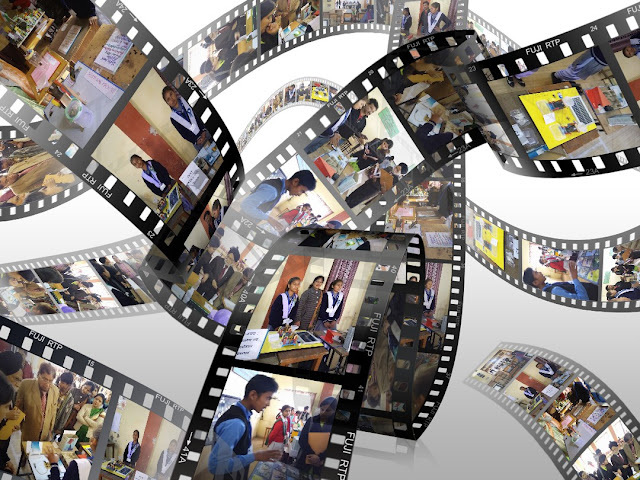ICT and Its Implications आई सी टी और इसका कार्यान्वयन
Implications of ICT आई सी टी और इसका कार्यान्वयन
http://www.jhigh.co.uk/Intermediate2/Using%20Information/27_implications_of_ict.html
In this section, we are going to investigate some of the social, legal, economic and ethical implications of using IT and Information Systems.
Social implications
Ease of access and availability
Many of us have very easy access to information systems both at school, college or work and at home. These are not just computer systems connected to the Internet, but digital TV with its comprehensive news channels and the ready availability of books, magazines and newspapers, all made more available by the use made of information systems.
We can have access to the Internet in our social lives as well with libraries having Internet access points and Internet cafes still being popular. Bars often have Internet access points and if you have stayed in a ‘big’ hotel lately you will find that the rooms have Internet access points for your laptop to plug into.
Many people expect Internet access when they go on holiday and many hotels and apartment complexes advertise Internet access as a desirable feature, but many of us think that we go on holiday to get away from it all and are willing to let the e-mails pile up until we get home.
An interesting fact emerged in the late 1990s that ‘there are more telephones in the city of New York than in the entire continent of Africa’. After a little research it was found that now the gap has not narrowed but widened, presumably because of mobile phones.
Information rich/information poor
There is some concern that the widespread use of computers is dividing society into two kinds of people – the ‘information rich’ and ‘information poor’. The information rich have easy access to computers and electronic communications. They get information and news from the Internet and buy the latest products through on-line shopping. They are able to follow computer-based learning and skills training courses at home, and look for jobs that are advertised solely on the Internet. They tend to find it easier to get well-paid jobs and will enjoy a more comfortable and secure life-style.
The information poor don’t have easy access to computers and don’t have the IT skills and confidence to take part in teleshopping, telebanking, Internet chat and news groups. As corporations like the BBC seek public opinion on current matters increasingly via the Internet, the voices of the information poor may not be heard. The jobs on offer to them will be less skilled, paid less and much more insecure. The information poor will have to work longer hours just to survive and will have less leisure time. Gradually the difference in access to information may create a real social divide between the materially rich and materially poor.
One effect of high levels of unemployment has been that families feel more secure with two wages coming into the family. This has meant that more and more mothers have careers. As a result, they may not have any children till they are thirty or older and even then they may only have one child because they do not want, or are afraid, to interrupt their careers.
Although this change in family patterns may only be indirectly and partly caused by computerisation, are there any risks to the family and to society as a whole from this development?
More and more families enjoy television, computers and electronic games in their homes. Father may be watching television; mother may be teleshopping over the Internet while the children are in their bedrooms playing arcade games. Research has shown that families are spending less and less time together. In addition, with the growth of teleworking, fewer people are meeting with colleagues to discuss business matters during the day.
Is there a risk that computers are having an adverse effect on human communication skills and relations within the family and in society in general?
Another less obvious effect of computers and IT on the family is the change that banks have made to our lives. Before banks were computerised, mainly relatively wealthy, middle-class professional people used them. Most workers were paid weekly and in cash, and they did not need a bank account. With the introduction of computerisation, banks started to persuade companies, government and local authorities to pay employees by cheque. In order to cash cheques it was much more convenient to have a bank account. Once a large part of the population had opened accounts, banks persuaded companies to pay their staff by transferring funds from the company account directly into their employees’ accounts. As a result, very little cash is in circulation now compared with the 1950s and 60s. Once people had become comfortable with carrying less cash, it was only a small step to persuade them to work with ‘plastic money’ – the current widespread use of debit and credit cards.
Educational qualifications and ICT
There have been qualifications in computing since the early 1960s, but these were solely in universities and colleges. And it was well into the 1980s before there was enough content to teach computing degrees that were able to concentrate on computing subjects and not need lots of Maths, Physics and totally unrelated courses like Philosophy and Law to fill out the degree course. It was not until the mid-1980s that computing was available in schools and not until 1999 that the two strands of software and hardware divided into Computing and Information Systems. Now there are many different courses offered at degree and NC level all related to ICT.
Look at how modern ICT allows citizens today to communicate and participate in society. We use text messaging to vote on TV shows, enter competitions and have our opinions broadcast on national TV and radio. We use digital TV to order goods, vote on TV shows like ‘I’m a computer teacher – get me out of here’, and many other functions. The most unlikely people are using ICT either because they have to or want to – teachers, lawyers, shop assistants, nurses ... the list is endless. Even grannies and aunties are downloading digital photos of the grandchildren and nephews and nieces, manipulating those photos with graphics software and saving them and producing lovely prints.
http://www.jhigh.co.uk/Intermediate2/Using%20Information/27_implications_of_ict.html







Comments
Post a Comment